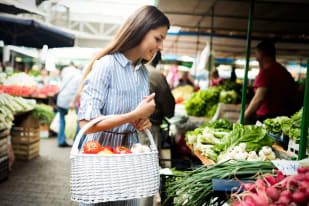The Local Food Initiative Farmers' Market in Revelstoke

A Community-Driven Market Supporting Local Food and Agriculture
Every Saturday morning from April to October, the Local Food Initiative (LFI) Farmers' Market in Revelstoke brings together farmers, food producers, and shoppers looking for fresh and locally grown products. The market is more than a place to buy food, it connects the community with sustainable agriculture, strengthens the local economy, and provides opportunities for small businesses. During the winter months, the market continues biweekly indoors, ensuring year-round access to local food.
Origins and Purpose of the Local Food Initiative

The Local Food Initiative was established in 2013 with a focus on education, advocacy, and support for local food production. The organization helps residents grow, access, and appreciate local food through workshops, community gardens, and partnerships with farmers and businesses. The market was created as part of this initiative to provide farmers and food producers with direct access to consumers.
The LFI’s mission is to improve food security and increase the availability of local produce. Through partnerships with schools, local government, and organizations, the LFI works to make fresh food accessible to more people in Revelstoke. The farmers' market is one of the most visible aspects of this mission, offering a place where people can find high-quality ingredients grown close to home.
What to Expect at the LFI Farmers' Market

Schedule and Location
The summer market operates every Saturday from 8:00 AM to 1:00 PM on First Street East in downtown Revelstoke. The winter market runs biweekly from November to April at the Revelstoke Community & Aquatic Centre. Both markets provide space for farmers, artisans, and food producers to sell their goods directly to the public.
Vendors and Products
Farmers bring seasonal fruits and vegetables, meats, dairy products, eggs, and honey. Artisans sell handcrafted items, including preserves, baked goods, and household goods made from natural materials. Local businesses offer prepared foods, coffee, and other specialty items. Shoppers can expect to find everything from leafy greens and berries in the summer to root vegetables and greenhouse-grown produce in the colder months.
Vendors are required to grow, raise, or produce their products within the region. This ensures that money spent at the market stays in the community, supporting small-scale agriculture and food businesses. The market encourages sustainable practices by prioritizing vendors who use organic and environmentally friendly methods.
Economic and Agricultural Impact

Support for Local Farmers
For many small farms, direct-to-consumer sales are essential. The LFI Farmers' Market provides a consistent sales outlet, reducing the reliance on large distribution networks. Farmers can build relationships with customers, educate people about their growing practices, and receive immediate feedback on their products. Some vendors, like Terra Firma Farms, focus on organic heirloom vegetables and ethically raised meats, offering options that are not always available in grocery stores.
Benefits for the Local Economy
Dollars spent at the market circulate within Revelstoke, supporting local businesses and job creation. Farmers reinvest in equipment, land, and labour, while artisans and food producers expand their operations based on demand. The market also attracts visitors, bringing additional spending to nearby restaurants and retail shops.
Community Engagement and Education

Workshops and Learning Opportunities
The LFI hosts workshops on gardening, preserving food, and composting. These sessions teach practical skills that help people grow and store their own food. Some programs focus on children, introducing them to food production through hands-on activities and school partnerships.
The community garden program provides space for residents to grow their own produce. The LFI also runs summer camps where youth learn about farming, cooking, and environmental stewardship. These initiatives aim to build long-term knowledge and appreciation for local food systems.
Special Events
The annual Garlic Festival celebrates local garlic growers with tastings, workshops, and cooking demonstrations. Other seasonal events highlight different aspects of food production and preparation, bringing together farmers, chefs, and community members to share knowledge and skills.
Addressing Food Security

The Food Commons Project
The LFI has partnered with the Indigenous Friendship Society of Revelstoke to develop an urban educational farm on a 1.8-acre plot. This project integrates Indigenous food traditions with sustainable agriculture practices, creating a learning space for the community. The farm provides fresh produce to local food programs and serves as a model for urban food production.
Food Recovery and Waste Reduction
The market and its vendors focus on minimizing food waste. Some unsold food is donated to community organizations, while composting programs help divert organic waste from landfills. Shoppers are encouraged to bring reusable bags and containers, reducing single-use packaging.
Challenges and Future Plans

Operational Challenges
Running a farmers' market requires balancing vendor needs, market logistics, and community expectations. Seasonal variations impact product availability, and recruitment of new vendors remains an ongoing effort. Volunteer engagement is essential for maintaining programs, but finding long-term support can be difficult.
Future Goals
Plans for the market include expanding vendor participation, increasing accessibility for lower-income shoppers, and enhancing educational programs. The LFI aims to strengthen partnerships with local institutions to further integrate local food into schools and community initiatives.
Conclusion
The Local Food Initiative Farmers' Market is more than a place to shop. It provides opportunities for small-scale farmers, strengthens the local economy, and promotes sustainable food practices. Through education and community engagement, the market encourages long-term food security and a stronger connection between residents and their food sources. Participation in the market, whether as a shopper, vendor, or volunteer, supports a resilient and self-sustaining food system for the region.

